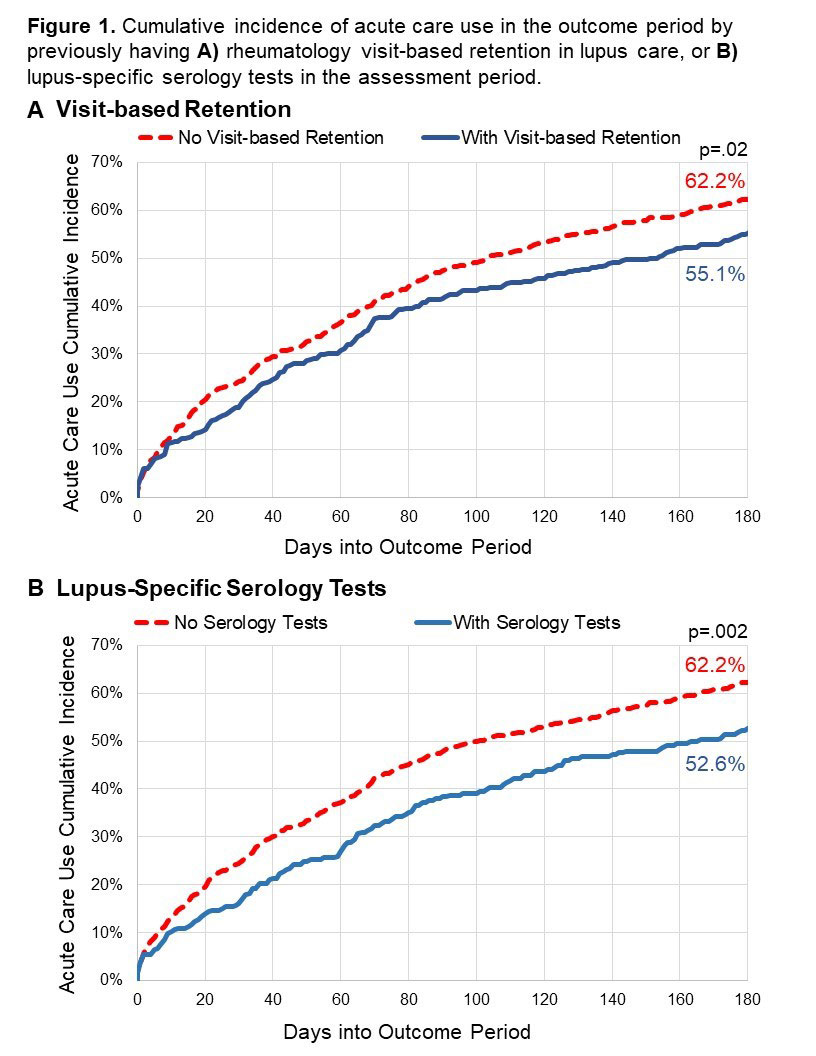Session Information
Session Type: Abstract Session
Session Time: 3:00PM-4:30PM
Background/Purpose: While high quality lupus care is associated with less damage, the impact of care use patterns and care quality on lupus outcomes remains unclear, and differential lupus care access and quality may contribute to outcome disparities. Thus, the objective of this study was to evaluate the associations of visit-based retention in lupus care (marker of access) or receipt of lupus-specific serologic testing (marker of quality) with acute care-free survival in a cohort of young adult Medicare beneficiaries with lupus.
Methods: We analyzed a geo-linked 20% national sample of young adult (ages 18-35) Medicare beneficiaries in this cohort study. Patients with lupus were included starting at their first hospitalization, rheumatology visit, or two other encounters at least two months apart with a lupus diagnosis code in 2013-2014. Patients were excluded if they lacked at least 18 months of claims after their qualifying lupus-coded healthcare encounter. In the first six months after inclusion, comorbidities were measured. The next 12 months captured rheumatology visits and lupus-specific serologic tests. Visit-based retention in lupus care was defined as a rheumatology visit in each six-month period of this year, while serologic testing was defined as at least one complement or dsDNA test. For up to 6 subsequent months, time until acute care use was measured including Emergency Department visit, observation stay, hospitalization, or death. Median acute care-free survival and six-month cumulative incidence were calculated. Associations of visit-based retention and serologic testing with acute care use were evaluated with Cox proportional hazards regressions (SAS v9.4).
Results: Among 1,036 young adults with lupus, the median time without acute care use was 118 days with a six-month incidence of 59.5% (Table 1). Observed acute care-free survival was longer in patients who had visit-based retention (154 vs 104 d, p=0.02; Fig 1) or serologic testing (166 vs 101 d, p=0.002) compared to those without.
After adjusting for baseline comorbidities like end-stage kidney disease, serologic testing associated with 21% lower acute care use (aHR 0.79, 95% CI 0.65, 0.97; Table 2). Visit-based retention was not significantly associated with acute care use after adjustment. Including adjustment for comorbidities, acute care use was higher for Black (aHR 1.34, 95% CI 1.07, 1.69), dual Medicare-Medicaid beneficiaries (aHR 1.30, 95% CI 1.00, 1.68) and in the South (aHR 1.27, 95% CI 1.01, 1.60). Pain disorders, electrolyte disorders, and tobacco use were also associated with higher acute care.
Conclusion: Receipt of a least one annual complement or dsDNA antibody test was associated with 21% lower subsequent acute care use, but this was achieved in only 28% of patients, despite using an annual threshold (vs. ACR guideline of every 6 mos). Acute care was higher in the South and for Black and dual Medicare-Medicaid beneficiaries, suggesting areas for improved care and patient support. Limitations include generalizability and lack of data on lupus severity or treatment. Nevertheless, findings suggest that connection with quality ambulatory care including lab testing may be important for preventing acute care use among young adults with lupus.
To cite this abstract in AMA style:
Schletzbaum M, Astor B, Powell W, Garg S, Gilmore-Bykovskyi A, Kramer J, Kind A, Bartels C. Association of Visit-based Retention and Receipt of Serologic Testing with Acute Care Use Among Young Adults with Lupus: A Medicare Cohort Study [abstract]. Arthritis Rheumatol. 2022; 74 (suppl 9). https://acrabstracts.org/abstract/association-of-visit-based-retention-and-receipt-of-serologic-testing-with-acute-care-use-among-young-adults-with-lupus-a-medicare-cohort-study/. Accessed .« Back to ACR Convergence 2022
ACR Meeting Abstracts - https://acrabstracts.org/abstract/association-of-visit-based-retention-and-receipt-of-serologic-testing-with-acute-care-use-among-young-adults-with-lupus-a-medicare-cohort-study/



